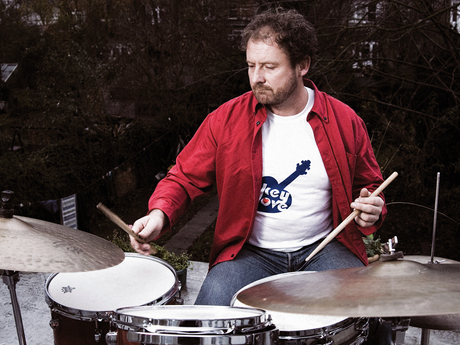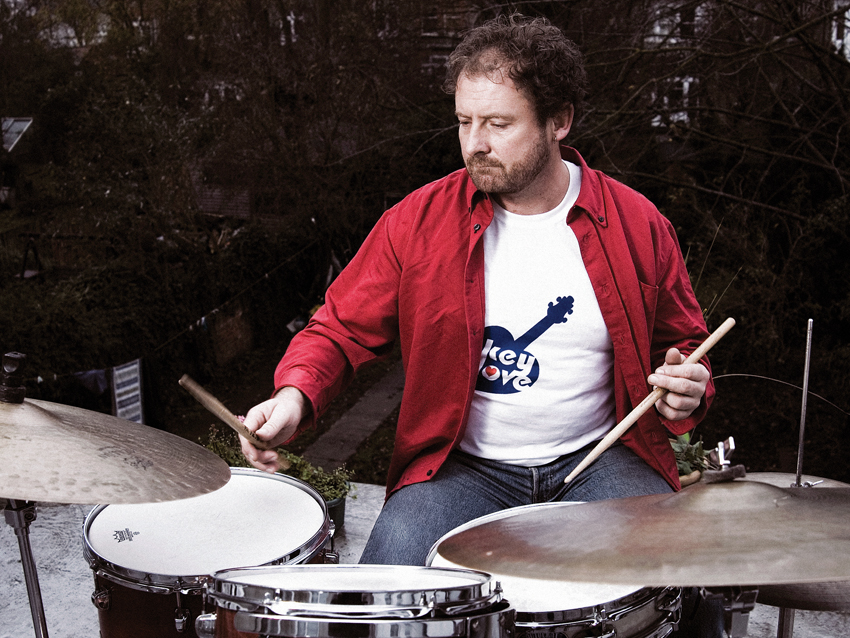8 essential tips for making it as a jazz drummer
Stuart Ritchie shares what it takes to get ahead

Want all the hottest music and gear news, reviews, deals, features and more, direct to your inbox? Sign up here.
You are now subscribed
Your newsletter sign-up was successful

Over the past two decades Stuart Ritchie has become a fixture on the jazz circuits of London and Edinburgh. His brilliantly inventive and musically aware drumming has won the respect of peers and critics alike.
A technical virtuoso, he can coax sounds from his kit that would be drowned by a whisper while also being equally capable of delivering a barrage of drum fury when required. He is as happy backing swinging vocalists such as Carol Kidd and Sheila Jordan as he is driving the Scottish-flavoured post-bop of trumpeter Colin Steele.
He is a founder member of two cutting edge trios, arthurs.hoiby.ritchie and Trianglehead, and his commitment to his instrument was further recognised when he was voted best drummer in last year's Scottish Jazz awards.
Stuart now divides his time between homes in London and Edinburgh. Rhythm caught up with him after a stonking gig at the London Jazz Festival 2010 to get his tips for a successful career as a jazz sticksman.
"Practising can be deadly so you have to enjoy it. Sometimes ignorance can be bliss because it makes you be creative. Now and again somebody shows you something and you go, 'Oh God, I've wasted a lot of time.' You haven't wasted time; the sticks are in your hands and that's more important."
1. Start anywhere
"I started playing in my home town, Aberdeen. The first band I played in was a funk band, and the first working group was a Scottish Ceilidh band - somebody asked me to fill in for a weekend and I stayed for three years.
"At the time there were four or five jazz musicians in Aberdeen who were quite good. I watched them for a couple of years and when I felt brave enough they'd let me play.
"I had a cousin that lived in Edinburgh and when I was 16 I went down for the Fringe and stayed for two and a half weeks. Edinburgh is very different from Aberdeen and I saw some guys playing modern jazz.
Want all the hottest music and gear news, reviews, deals, features and more, direct to your inbox? Sign up here.
"I came to London for a year when I was 19 and met and studied with Richard Newby, the great drum fixer and finisher. I then saved up to go to a week-long clinic in Boston organised by the international association of Jazz Educators. I came back and thought, 'right, I can't stay in Scotland because whatever's happening here is not enough, I'm going to move to London,' and that's when everything started to kick in."
2. Love music
"I don't listen exclusively to jazz. I grew up listening to John Peel's radio show - that was incredible, but there was not a drop of jazz played on it. I did recognise that jazz seemed to be far more intricate - there was a far higher level of craft on display. That was a challenge I wanted to embrace."
3. Learn the trade
"You have to put in the hours practising. I found out recently that it takes around 10,000 hours for your muscles to really attain a degree of memory. A lot of the time I practise very, very quietly and get the muscles to control things at super quiet dynamics - I play with chopsticks sometimes.
"Practising can be deadly so you have to enjoy it. Sometimes ignorance can be bliss because it makes you be creative. Now and again somebody shows you something and you go, 'Oh God, I've wasted a lot of time.' You haven't wasted time; the sticks are in your hands and that's more important."
4. Get out there and play
"The great thing about musicians is that our craft is a shared thing. If you've got a mate who plays guitar, a mate who plays keyboards then get with them. It doesn't matter what you play, just get that shared experience. You make mistakes and you realise instinctively, 'That didn't work, next time I won't do that again.'
"Getting used to hearing another instrument playing while you're sitting behind an instrument is a beautiful thing and teaches you about balance, touch and how to appreciate the nuance."
Next: listening, learning another instrument and hard knocks
5. Listen, listen and listen
"The ears are the first thing - your key into it all. Your ears are the greatest tool because they guide you more than anything and as you develop as a musician you hear more. The ultimate situation you can be in is that the band is really cooking and you're not even hearing what you're playing - you're listening so hard that you're not actually listening to yourself.
"I don't listen to myself because I know what I sound like, I practise all the time - I want to hear what the others are playing. As you hear something, you respond.
"There's not necessarily a right and a wrong thing to play; there are certain playing areas that you can get into which are more suitable than other things, but nothing actually black and white. The beauty of jazz is that it's a very ambiguous music, it is ultimately a feeling."
6. Learn to play another instrument
"Anyone showing the slightest interest in jazz is probably going to have sat down behind a piano - it's certainly going to help you. Nine times out of 10 any other instrument from the drumset is going to be quieter. Learn to play, or at least experiment with, an instrument that you can play at 3 o'clock in the morning without waking up the grumpy man who lives downstairs and may well be your dad…"
7. Be prepared to take a few knocks
"It's feast and famine but you have to stay focused. A great saxophone player I've known for a long time and used to play with a lot decided he was going to make a record. He used an older drummer who was better known than me. He wanted to make a record that was as good as he could, but I was heartbroken. It really hurt at the time, but it made me say, 'Okay, I'm going to use this and I'm going to get better,' and that's what you do.
"If you stay focused on the music then it will carry you through the hard knocks."
8. Work with musicians who inspire you
"I'm lucky that I get to play with some fantastic musicians. It's taken a long time. I've been working with Tom Arthurs and Jasper Hoiby for six years now (in arthurs.hoiby.ritchie) and the music's been getting more and more intense. If somebody in the group can't do a gig, we can't do that gig - it's far too subtle and involved and emotional for that.
"Find musicians who really inspire you. If they inspire you, they're probably going to inspire a lot of other people."